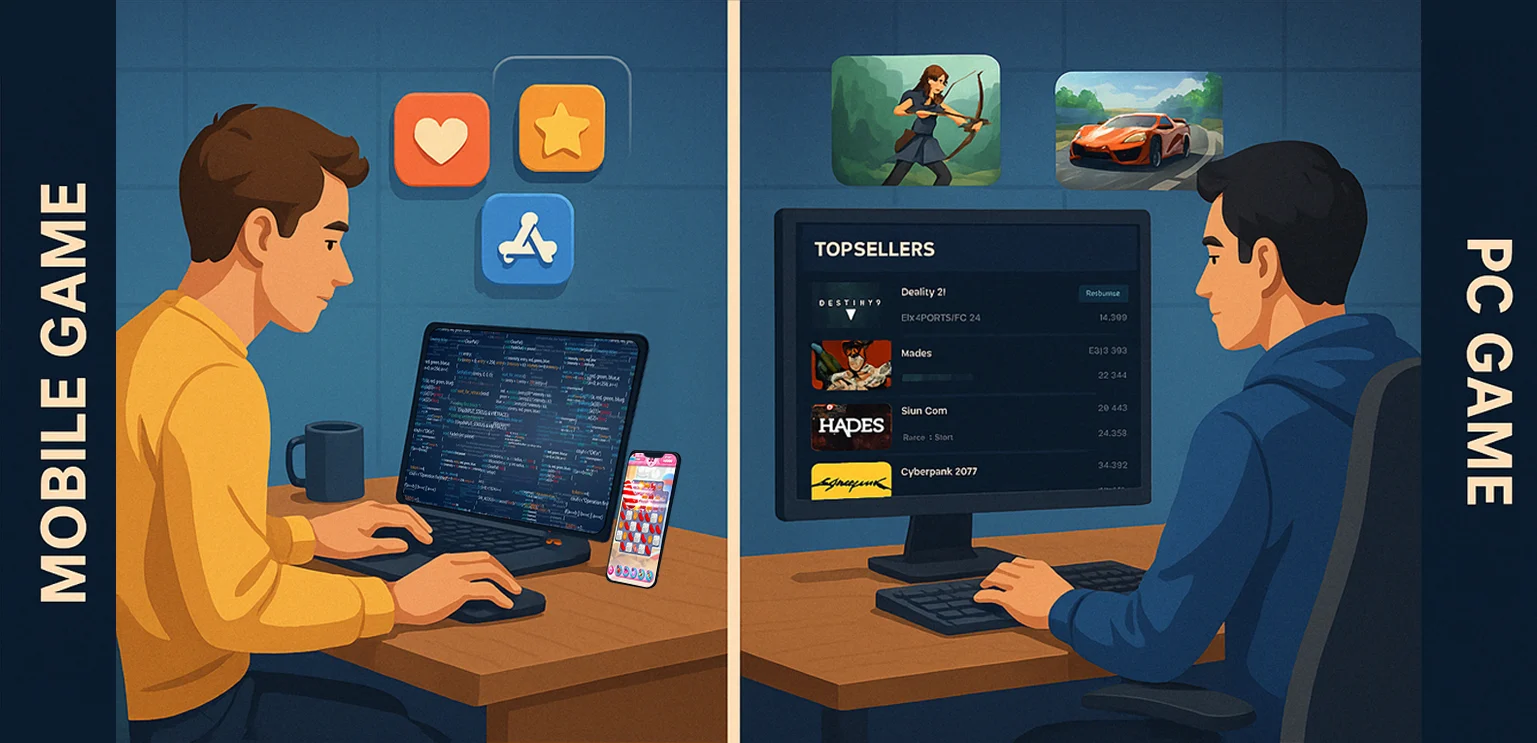Mobile vs PC Games: Which Is More Profitable in 2025?
Introduction: A Developer’s Crossroads
Picture yourself as a passionate game developer with an exciting idea waiting to come to life. You're passionate about bringing your vision to life, but you're faced with a critical decision: Should you develop your game for mobile devices or for PCs? This choice isn't just about personal preference; it's about understanding the market, the potential reach, and, importantly, the profitability.
At Gamix Labs, we've guided numerous developers through this very decision. Let's delve into the intricacies of mobile and PC game development to help you make an informed choice.

Market Overview
📱 Mobile Gaming
- Market Share: In 2024, mobile games accounted for approximately 49% of the global gaming market revenue, generating around $92.6 billion.
- User Base: Over 2.7 billion mobile gamers worldwide, with numbers steadily increasing.
- Monetization: Primarily through in-app purchases, ads, and freemium models.
💻 PC Gaming
- Market Share: PC games contributed 23% of the global gaming revenue in 2024, amounting to approximately $43 billion.
- User Base: A dedicated community of gamers, often favoring high-quality graphics and complex gameplay.
- Monetization: Through game sales, downloadable content (DLC), and subscriptions.
Development Costs and ROI
Mobile Games
- Lower Development Costs: Mobile games generally require less investment, with simpler graphics and shorter development cycles.
- High ROI Potential: Successful mobile games like Candy Crush and Clash of Clans have generated billions in revenue through micro-transactions.
PC Games
- Higher Development Costs: Developing a PC game, especially AAA titles, demands significant investment in graphics, mechanics, and testing.
- Steady Revenue Stream: While the initial investment is higher, PC games can offer a steady revenue stream through dedicated fan-bases and ongoing content updates.
Audience Reach and Engagement
Mobile Games
- Global Accessibility: With smartphones becoming ubiquitous, mobile games have a vast potential audience.
- Casual Gaming: Attracts a wide range of players, including those who don’t typically consider themselves gamers.
PC Games
- Dedicated Gamers: PC games often attract hardcore gamers seeking immersive experiences.
- Community Building: Strong communities can form around PC games, leading to long-term engagement.
Development Challenges
Mobile Games
- Platform Fragmentation: Developers must ensure compatibility across various devices and operating systems.
- Crowded Marketplace: The mobile gaming space is saturated, making it challenging for new games to stand out.
PC Games
- Technical Demands: Higher expectations for graphics and performance require robust development resources.
- Longer Development Time: Creating a polished PC game can take years, delaying potential returns.
Strategic Considerations
- Target Audience: Identify who your game is for. Casual gamers? Hardcore enthusiasts?
- Budget Constraints: Assess your available resources for development and marketing.
- Long-Term Goals: Are you aiming for quick returns or building a lasting franchise?
Gamix Labs: Your Development Partner
At Gamix Labs, we’ve worked closely with creators across both mobile and PC platforms. From your very first idea to the final launch, our experienced team is here to help you bring your vision to life—every step of the way.
Conclusion
PC and Mobile game development each come with unique advantages:
- Mobile games offer wider reach and faster returns.
- PC games deliver richer experiences and lasting engagement.
The best choice depends on your vision, budget, and the players you want to reach.
Is it more profitable to build mobile games or PC games?
It depends on your goals. Mobile games can reach huge audiences fast and often pay back quicker through ads and in-app purchases. PC games cost more and take longer, but they can deliver steady revenue via premium sales, DLC, and loyal communities.
How do development costs and ROI differ for mobile vs PC?
Mobile projects are usually cheaper and faster to ship, so ROI can arrive sooner if retention and UA work well. PC games often need bigger budgets (better art, deeper systems, extensive QA), but strong wishlists, reviews, and updates can create long-tail income.
What monetization works best on each platform?
On mobile: freemium models—in-app purchases, rewarded ads, hybrid monetization. On PC: premium sales, DLC/expansions, season passes, and sometimes subscriptions. Pick what fits your design: short sessions and cosmetic IAPs suit mobile; deeper content drops and DLC fit PC.
Who is the right audience for mobile games vs PC games?
Mobile taps casual players worldwide—quick sessions, simple controls, broad reach. PC attracts dedicated gamers who want rich graphics, deeper mechanics, and community features (mods, co-op, competitive play). Match your game’s complexity and theme to the audience you want to serve.
How should a team choose the platform in 2025?
Use a quick checklist: Player fit: casual pick-up-and-play (mobile) vs deep, core gameplay (PC). Budget & timeline: lean and fast (mobile) vs larger scope (PC). Monetization plan: ads/IAP vs premium/DLC. Go-to-market: UA + creatives (mobile) vs wishlists, demos, community (PC).